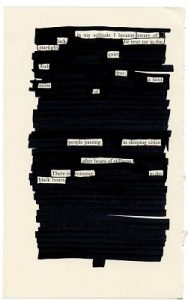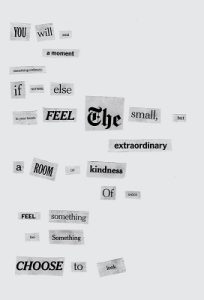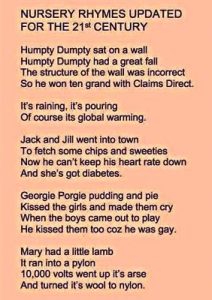
You’ve probably heard of sonnets, free verse poetry, haiku, and even slam poetry. But there’s more to the world of poetry than the standard formats. At Writer’s Relief, we know that poetry is experiencing a renaissance on social media platforms like Instagram and Twitter, where visually inspired, cutting-edge, and just plain unusual poetic forms are getting noticed. Learn more about blackout poetry, refrigerator poetry, and other radical forms of poetry that are capturing readers’ attention.
Blackout, Refrigerator, And Other Radical Poetry Forms
Blackout Poetry (also called found poetry): Blackout poetry involves taking a page of printed media—usually worn-out books, but also newspapers or magazines—and reworking it into your own poem. How? By literally blacking out (by hand or digitally) all of the words you wish to omit from the poem. This often leaves whole sentences and phrases intact, but creates an entirely new meaning. Check out this blackout poetry by Tyler Knott Gregson:


Refrigerator Poetry (also called magnetic poetry): Refrigerator poetry is a fun way to break through writer’s block and create poetry using magnets and a metal surface as your writing tools. Each magnet should feature a different word and can be arranged randomly or deliberately into poetry on the unconventional surfaces of your kitchen refrigerator or office file cabinet. What makes refrigerator poetry an exciting writing exercise for poets is its spontaneity. You never know which word or phrase will catch your eye and inspire a new poem, even while grabbing the ingredients to prepare dinner. You can purchase a magnetic poetry kit at local bookstores, or here.
Here’s an example to help you get started: “A Refrigerator Love Poem For My Husband” by Audrey Kletscher Helbling


Cut & Paste Poetry: Cut & paste poetry is similar to both refrigerator poetry and blackout poetry, and is created by clipping words from magazines and newspapers and assembling them into poetry. Not only can this technique be used as a writing exercise to inspire your next poem, but it’s also an interesting way to recycle and repurpose old print media. Plus, your poem will have an interesting visual aesthetic: It will resemble an old-fashioned ransom note!
If you prefer technology to scissors, you can also create digital cut & paste poetry. Simply screenshot words from different websites and combine them into poetry. This is also known as the CTRL+C and CTRL+V method, named after the keyboard shortcuts for copying and pasting.
This poem by Leah Umansky uses the cut & paste technique:


Vocabularyclept Poetry: This radical poetry form is essentially creative thievery, where you take another poet’s existing poem and rearrange the words to create a completely different, new poem. A common vocabularyclept poetry method is to rearrange the words of a poem into alphabetical order, then craft a new poem from the words without being distracted by the original poet’s intent. This can be a great way to spark new ideas for your writing, but we recommend treading lightly with attempting to get your vocabularyclept poem published. It may be considered plagiarism depending on how much you change or if proper credit is not given.
Alternative Nursery Rhymes: Writing alternative nursery rhymes is a great way to strengthen your writing by finding new twists within the classic verses. You can take a nursery rhyme like “Jack and Jill” or “I’m a Little Teapot” and give it an updated or satirical spin. You may even wish to keep the original rhyme scheme, but alter the message. Even subtle changes in these well-known nursery rhymes can create impactful poetry if done well. Just be sure the original nursery rhyme can still be identified in order to achieve the best effect.
Here’s an example of an alternative nursery rhyme. Bonus: 20 literary magazines that publish rhyming poetry.


Word/Syllable Count Poetry: Word or syllable count poetry is an exercise in restraint and can result in incredible, minimalistic poems. This technique encourages poets to stick to a rigid (and extremely limited) word count or number of syllables. You can find different word count poetry challenges on Twitter or Instagram for countless examples: #3wordpoem, #12wordpoem, and just about everything in between.
Trying new poetic forms is a fun, effective way to keep your writing fresh. If you’d like to try even more unique poetry forms, check out 11 more poetry forms you’ve never heard of (but should have)!
Question: Which radical form of poetry are you most likely to try?

















Loved the ideas of Refrigerator Poetry, Cut & Paste Poetry and Vocabularyclept Poetry! Believe these would help brainstorming and idea generation!